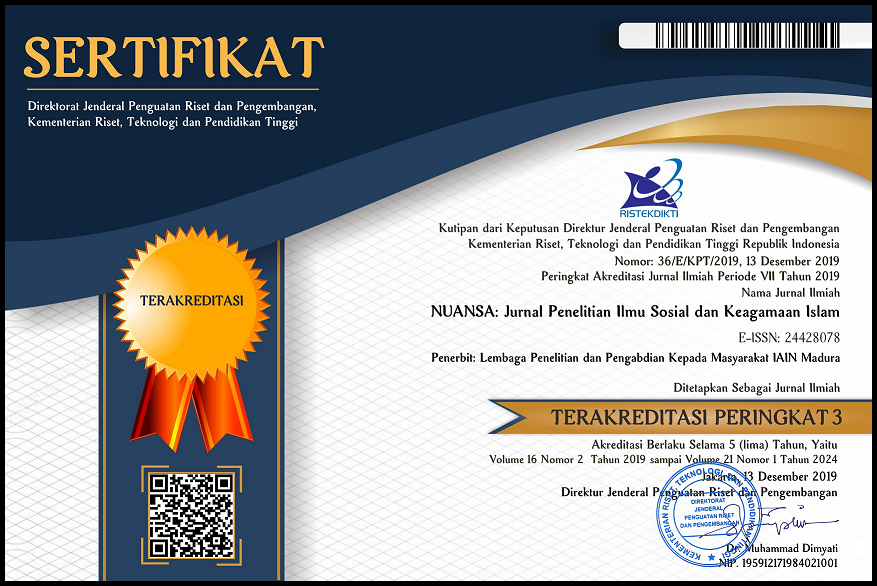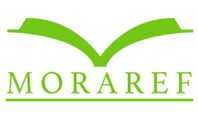Strategy and Evaluation of The Implementation of Moral Values at Islamic Universities
 Abstract views: 317
,
Abstract views: 317
,
 PDF downloads: 272
PDF downloads: 272
Abstract
Penerapan nilai-nilai Islam pada Perguruan Tinggi Islam merupakan hal yang diterapkan dalam tiap aspek kehidupan kampus dan oleh seluruh civitas academia kampus. Nilai-nilai Islam adalah hasil eloborasi antara aturan yang berlaku dengan aspek ibadah dan moralitas. Penerapannya berhubungan dengan perilaku tiap individu hubungannya dengan Allah dan dengan manusia. Penelitian ini bertujuan untuk penerapan nilai-nilai Islam di Perguruan Tinggi Islam. Metode yang digunakan dalam penelitian ini ialah kualitatif dengan wawancara mendalam, observasi dan studi dokumen. Penelitian ini dilakukan pada tiga Perguruan Tinggi Islam yaitu UIN Syarif Hidayatullah Jakarta, Universitas Al Azhar Indonesia dan Universitas Muhammadiyyah Jakarta dengan nara sumber berasal dari pimpinan kampus, fakultas, staf dan mahasiswa. Hasil penelitian ini menunjukkan bahwa penerapan nilai-nilai Islam pada tiga Perguruan Tinggi tersebut sudah terlaksana namun belum optimal. Hal yang menjadi kendala ialah hambatan pada penerapan ini baik level atas hingga bawah ditambah lagi kebijakan yang belum tertulis atau tersedia pada buku pedoman penerapan. Belum adanya Standar dalam evaluasi penerapan nilai Islam menjadi kendala dalam penerapan sehingga tidak dapat diketahui kategori atau tingkatan penerapan nilai-nilai Islam.
(The implementation of Islamic values in campus life is the realization of Islamic values in the form of norms in every aspect of campus life carried out by all levels of the campus community. The elaboration of Islamic values is embodied in the form of legal norms, state, and morals framed in aspects of worship and morality. However, the realization is associated with the behavior of each individual in relation to Allah (hablumminallah) and its relationship with humans (hablumminanas). The purpose of this study is to know the depiction of the application of Islamic values in Islamic universities.The method used is qualitative research method with in-depth interview, documentation, and observation. This research was conducted at three Islamic universities, namely UIN Syarif Hidayatullah Jakarta, UAI, and UMJ with sources from university leaders, faculties, departments, staffs and students. The results show that Islamic values have been applied at the three campuses but not yet optimal, because there are obstacles both at the level of leaders and at the level of students and staff. Barriers at the level of leaders related to the policy agreement to apply Islamic values for all academic communities that affects the availability of a guidebook containing Islamic values. The guidebook could not be used effectively as a medium of socialization for all academic communities. These obstacles also affect the evaluation of the implementation of Islamic values, where the three campuses do not have a standard for evaluation to use in all parts of campuses. Therefore, it is difficult to know the level of the application of Islamic values.)
Downloads
References
Al Qur’an
A. Hasanah., N. Gustini., dan D. Rohaniawati, “Cultivating Character Education Based On Sundanese Culture Local Wisdom”. Jurnal Pendidikan Islam, 2016, hal. 231-253. Retrieved from https://doi.org/10.15575/jpi.v2i2.788
Andewi Suhartini, “The Internalization Of Islamic Values In Pesantren”. Jurnal Pendidikan Islam, Vol. 2 No. 3, December 2016, hal. 429-444.
DOI: http://dx.doi.org/10.15575/jpi.v2i3.827.
C. Subarkah., R. Rahmawati., dan A. Dalli, “Internalizing Islamic Values In Electrochemistry Learning”. Jurnal Pendidikan Islam, Vol. 2 No. 2, 2016, hal. 270-286. https://doi.org/10.15575/jpi.v2i2.790
Eros Meilina Sofa, “Islamic Values in Higher Education Students’ Communication in Edmodo Learning Platform”. Vol. 3 No. 1, 2018, hal. 50-65. DOI: https://doi.org/10.28918/jei.v3i1.1678
Muhammad Amin, “Sosialisasi Nilai-Nilai Agama Di Kalangan Mahasiswa Program Studi Sosiologi Agama Uin Sunan Kalijaga”. Sosiologi Agama: Jurnal Ilmiah Sosiologi Agama Dan Perubahan Sosial, Vol. 10No. 2, Juli-Desember 2016, hal. 133-154. DOI: https://doi.org/10.14421/jsa.2016.102-05
Muhaemin. Peran Perguruan Tinggi Agama Islam (PTAI). 2019. https://stitmaa.wordpress.com.2009/03/14/peran-perguruan-tinggi-agama-islam-ptai/. Diakses, Kamis 9 Maret 2016, pkl. 11.30.
M. Musrin. Sistem Nilai Dan Pandangan Hidup serta Relasinya Dengan Ilmu Pengetahuan. Jakarta: Wardah. 2004.
M. Othman, “Pembentukan Akhlak Pelajar Menerusi Aplikasi Teknik-teknik Penerapan Nilai Dalam Pengajaran”. The Online Journal of Islamic Education, Vol. 4 No. 1, 2016, hal. 58-70. Retrieved from http://ejournal.um.edu.my/public/article-view.php?id=9106
Nur Kafid dan Nur Rohman, “Islamic Higher Education and Religious Transformation of The Muslim Community’s Surrounding”. Jurnal Islamika, Vol 4, No 1, 2018, hal. 27-38. DOI (PDF): https://doi.org/10.15575/jpi.v4i1.2069.g1725
http://e-journal.iainpekalongan.ac.id/index.php/edukasiaislamika/article/view/1678
Nur Aini,“Internalisasi Nilai-Nilai Pendidikan Agama Islam Pada Kegiatan Ekstrakurikuler Rohaniah Islam Dalam Membina Karakter Peserta Didik Di Sma Negeri 1 Air Putih Kecamatan Air Putih Kabupaten Batu Bara”. Jurnal ANSIRU: PAI, Vol. 3 No. 2, 2019, hal. 49-61. DOI: http://dx.doi.org/10.30821/ansiru.v3i2.5849
Nurdin Muslim. Moral dan Kognisi Islam. Bandung: Alfabeta. 1993.
Nurlaela Sari, “The Importance Of Teaching Moral Values To The Students”. Journal of English and Education, Vol. 1 No. 1, 2013, hal. 154-162.
P.N. Pasaribu dan Indupurnahayu, “The Measurement Of The Islamic Values For Muslim Workers”. Jurnal Manajemen, Volume 9 Issue 2, 2018, hal. 171-186. DOI: 10.32832/jm-uika.v9i2.1560.
Ramezan Jahanian, “Educational Evaluation: Functions and Applications in Educational Contexts”. International Journal of Academic Research in Economics and Management Sciences, Vol. 1 No. 2, 2012, hal. 253.
R.M. Niculescu., Mariana Norel, “Religious Education An Important Dimension Of Human’s Education”. Procedia - Social and Behavioral Sciences 93, 2013, hal.338 – 342. 3rd World Conference on Learning, Teaching and Educational Leadership – WCLTA 2012. DOI: 10.1016/j.sbspro.2013.09.200
Rozalinda. Ekonomi Islam, Teori dan Aplikasinya pada Aktivitas Ekonomi. Jakarta: Raja Grafindo Persada. 2014.
S.A. Nulhaqim., R.D. Heryadi., R. Pancasilawan., M. Fedryansyah, “Peranan Perguruan Tinggi Dalam Meningkatkan Kualitas Pendidikan Di Indonesia Untuk Menghadapi Asean Community 201533 Studi Kasus: Universitas Indonesia, Universitas Padjadjaran, Institut Teknologi Bandung”. Social Work Jurnal, Vol. 6 No. 2, 2016, hal. 154-272. DOI : https://doi.org/10.24198/share.v6i2.13209
S. Eko Putro Widoyoko. Evaluasi Program Pembelajaran. Panduan Praktis Bagi Pendidik dan Calon Pendidik. Yogyakarta: Pustaka Pelajar. 2012.
Tri Saswandi., A.P. Sari, “Analisis Penerapan Nilai-Nilai Al Islam Dan Kemuhammadiyahan Dalam Perkuliahan”. Jurnal EDUCATIO. Jurnal Pendidikan Indonesia,Vol. 5 No. 1, April 2019, hlm 27-34. DOI: https://doi.org/10.29210/120192327.
The journal operates an Open Access policy under a Creative Commons Attribution-NonCommercial 4.0 International License (CC-BY-NC) 
Authors who publish with this journal agree to the following terms:
- Authors retain copyright and grant the journal right of first publication with the work simultaneously licensed under a Creative Commons Attribution License that allows others to share the work with an acknowledgement of the work's authorship and initial publication in this journal.
- Authors are able to enter into separate, additional contractual arrangements for the non-exclusive distribution of the journal's published version of the work (e.g., post it to an institutional repository or publish it in a book), with an acknowledgement of its initial publication in this journal.
- Authors are permitted and encouraged to post their work online (e.g., in institutional repositories or on their website) prior to and during the submission process, as it can lead to productive exchanges, as well as earlier and greater citation of published work.





















